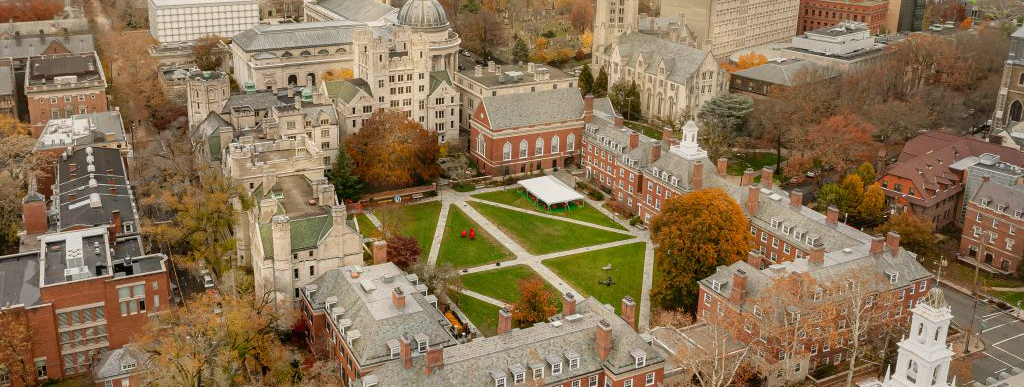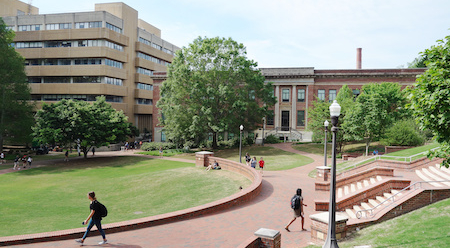Updated: Monday, September 30, 2024
Princeton vs Harvard: Which One Should You Choose?

When most students think of top-tier colleges, Princeton and Harvard are likely some of the first schools to come to mind. Both institutions are members of the Ivy League that have plenty of famous alumni, as well as ample research and learning opportunities.
Despite these similarities, several distinguishing factors set each university apart. Keep reading to learn more about how Harvard and Princeton compare to one another and what this might mean for your own list of best-fit colleges.
Is Harvard or Princeton More Prestigious?
While prestige should not be a deciding factor in your college application decisions, plenty of students are interested in learning how their potential best-fit schools might stack up to other universities. When it comes to comparing Harvard University versus Princeton University, it’s challenging to pick a winner because institutions are exceptionally prestigious. Harvard and Princeton are both members of the Ivy League, and each school is known for its extremely low acceptance rate and ongoing commitment to academic excellence.
Why Is Princeton So Popular?
There are several reasons why Princeton University has become so popular, especially in recent years. Many students like the fact that the institution places a heavy emphasis on its undergraduate population and developing research opportunities for these students. Others are drawn to the school’s sprawling campus, which is within commuting distance to New York City. Princeton University is known for providing both a top-tier academic education with ample course offerings, as well as plenty of extracurricular options and opportunities to connect with the student body.
Is It Easier to Get Into Harvard or Princeton?
Applying to Princeton is an exceptionally competitive admissions process. Most recently, the acceptance rate for the college hovered below 4%, whereas just 10 years ago it was more than double that. Only 2.6% of admitted students had GPAs that were below 3.5 and approximately 10% maintained a 4.0 throughout all four years of high school.
In contrast, Harvard’s acceptance rate for the same year was slightly lower, at 3.2% of applicants for the Class of 2026. This number shows that the acceptance rates for Harvard and Princeton are nearly identical, with Harvard maintaining the smallest edge when it comes to selectivity.
What does Harvard look for? Namely, the university will affirm students who have a demonstrated track record of academic excellence, in addition to strong ties to their community and active participation in extracurricular pursuits. Most recently, the average unweighted GPA for admitted Harvard students was 3.9, with the weighted GPA hovering around 4.15.
Should I Choose Harvard or Princeton: A Quick Overview
Given both school’s superior academic standings and well-honed reputations, students may have a challenging time deciding between Harvard University and Princeton University. Ultimately, there isn’t one obvious choice when it comes to picking which school is better. Instead, students must weigh the pros and cons of each option to decide which school best aligns with their needs and goals.
Why Would Someone Choose Princeton Over Harvard?
Students might choose Princeton over Harvard if they’re looking for a sprawling campus in a more suburban environment. On average, Princeton University has larger class sizes but a lower student to faculty ratio, which means it might be a better option for outgoing students who aren’t afraid to speak up in a larger lecture course. Other applicants who prefer Princeton University may be interested in joining one of the school’s eating clubs, which are social groups that maintain strong ties with their alumni network.
Why Would Someone Choose Harvard Over Princeton?
In contrast, students may prefer Harvard University to Princeton University for many reasons. If you’re looking for a campus with more of an urban feel, Harvard might be a better option because it is located within Boston as opposed to an hour or so outside of a major metropolitan area (NYC). Harvard also has smaller class sizes, which might be ideal for students who prefer a more personalized, small group approach to learning. Additionally, Harvard has a vast number of different extracurricular opportunities for students to explore outside of their studies, including more than 450 student organizations such as publications, orchestras, community service programs, intercollegiate athletic teams, and political and social groups.
Princeton vs. Harvard: Which College Is Right for You?
There’s no doubt that deciding between Princeton University and Harvard University is an exceptionally challenging decision to make. Before students choose one school over the other, they will need to know as much as possible about both institutions. Here are a few core considerations that students should keep in mind as they weigh the pros and cons of each choice and strive to come to a decision.
Size
Harvard and Princeton are both considered medium-sized liberal arts colleges. Both schools have slightly over 5,000 undergraduate students on campus, in addition to graduate school offerings. Harvard has significantly more graduate students on campus, with approximately 20,000 compared to 3,500 at Princeton. The median class size at Harvard is smaller, at 12, versus Princeton’s 20. Finally, the student to faculty ratio is higher at Harvard University, where it is 7:1 compared with 4:1 at Princeton University.
Subject Strengths
Both Harvard and Princeton have a number of programs, majors, and concentrations that the schools are known for. At Harvard University, some of the most popular areas of study for undergraduates include Psychology, Mathematics, and Computer Science. Harvard is also well-known for its Molecular and Cellular Biology program, which is designed for students who are interested in understanding the intersection of modern research in cellular biology with medicine and society.
Princeton University also has plenty of reputable academic offerings to its name. The school is known for Engineering, History, Computer and Information Sciences, as well as social sciences. Students who are interested in a potential career in public policy can choose to major in a multidisciplinary liberal arts degree at Princeton’s top-ranked Woodrow Wilson School of Public and International Affairs.
Location
Princeton and Harvard are both located in the Northeast region of the United States. Harvard is located in Cambridge, Massachusetts, which is just across the Charles River from Boston. The campus is within a short walking distance from the Boston subway line, known as the T, which allows students to explore the different areas of both Boston and Cambridge. Harvard University is near many other renowned academic institutions, including the Massachusetts Institute of Technology, Wellesley College, Boston College, Boston University, and Northeastern University.
In contrast, Princeton University’s location is decidedly less urban. It’s considered to be part of a quiet college town with the same name in New Jersey. Students are fully integrated into the community. The relatively small town might be an ideal option for students who are looking for a campus that is part of a distinctively suburban environment. Yet, students who are interested in experiencing city life shouldn’t feel discouraged from applying to Princeton University, as the institution is only approximately an hour away from New York City, meaning Princeton students can easily get into the five boroughs for a weekend trip or professional opportunity.
Student Community
Both Harvard and Princeton are known for having active, engaged campus communities and cultivating tight-knit cultures that empower students to grow and learn from their peers. Princeton and Harvard are committed to diversity, with each college striving to admit students from all geographic locations, socio-economic backgrounds, races, and religions. International enrollments hover around 12% at both Harvard and Princeton.
Greek life is not a big part of the on-campus experience at either Harvard University or Princeton University. Harvard has a rule against recognizing single-gender groups. However, there are three male fraternities and three female sororities that are not officially acknowledged by the university. Princeton does not have any fraternities or sororities that are officially recognized by the school. Instead, Princeton has eating clubs, which is part of a tradition that dates back to the 1870s. There are currently 11 eating clubs, each with a distinctive character. The clubs are independent, private institutions that do not have any formal ties to the university. They are managed by graduate boards, undergraduate officers, and professional club managers.
In addition to social clubs, students have plenty of opportunities to get to know their peers by getting involved on campus. At Harvard, there are more than 450 student organizations, including publications, orchestras, community service programs, and intercollegiate athletic teams. Similarly, Princeton University boasts hundreds of student activities on campus, including everything from slam poetry, to tutoring young children, to making chocolate. There are also an array of different arts and cultural activities, such as a cappella groups, literary publications, and dance companies.
Weather
Since both Princeton and Harvard are located in the Northeast region of the United States, the weather at the colleges is fairly similar. Students experience all four seasons, and those from warmer regions should come prepared for colder weather and occasional snow storms. As the school that is further north, the weather is typically a bit cooler at Harvard than Princeton, but both campuses generally have a few months of chilly temperatures.
Academics
Princeton and Harvard are two of the most academically rigorous colleges in the country. Admissions officers for both schools are looking to affirm applicants who have challenged themselves by taking advanced level coursework when available, as well as students who have high GPAs and impressive test scores. Harvard and Princeton both utilize a holistic admissions review process, meaning that academics are only part of the decision process; students must also have demonstrated interests and passions, an ongoing commitment to serving their community, and a well-articulated desire to attend the college upon admittance.
Once students are accepted to Harvard or Princeton, there will be no shortage of academic opportunities for them to participate in. Both schools offer study abroad programs that enable students to continue their education while learning about a different country and its culture. There are also plenty of research opportunities as well as internships for students who are looking to build their resumes and set themselves up for success professionally.
Since Harvard and Princeton each have relatively low student to faculty ratios, students at both colleges will have ample opportunity to get to know their professors and potentially work with them on research opportunities. Building close relationships with undergraduate professors is often particularly valuable for students who are interested in pursuing graduate degrees, as most business schools, medical schools, and law schools will ask for letters of recommendation.
Accommodation
Accommodations at Harvard vary significantly from those at Princeton. At Harvard, first-year students live in shared suites located near Harvard Yard. Second-year students are placed in one of Harvard’s 12 houses by lottery in an effort to foster a sense of community. The vast majority of undergraduate students live on campus. There is also gender inclusive housing, in which students can choose to live together regardless of their gender identity.
At Princeton, students are required to live on campus during their first two years of college. Many upperclassmen choose to do the same. Residential colleges include a mix of students from all classes. There is specialty housing available, including substance-free housing.
Food
Princeton has a variety of dining options. All freshmen and sophomores are automatically enrolled in unlimited meal plans, which accommodate various dietary restrictions.
At Harvard, all undergraduates living on campus are required to be on an unlimited meal plan. There is one dining hall that is exclusive to freshmen known as Annenberg Hall. Other students eat in their House dining halls. Harvard is known for offering cuisines from all over the world. The dining halls are also designed to accommodate various dietary restrictions including allergies and vegetarian/vegan.
Financial Aid
Both Harvard and Princeton are known to have high tuition costs, with sticker prices surpassing $70,000 per semester. Fortunately, both schools also have a well-deserved reputation for being extremely generous with their financial aid policies. At both Harvard University and Princeton University, more than half of the undergraduate student body receives financial aid and some students qualify for aid that covers the entire cost of tuition and room and board. Both institutions are no-loan, need-blind, and committed to meeting full demonstrated financial need. As a result, students won’t receive loans in their financial aid awards and their financial aid will cover 100% of the difference between their expected family contribution and the cost of attendance.
Neither Harvard or Princeton award merit scholarships. Instead, they are given on the basis of need only. Yet, students can still receive scholarships from outside organizations, which will be factored into their financial aid package.
Looking for Strategic College Advice?
With so many different factors to consider and priorities to weigh, making decisions about where to attend college is never easy, especially if you’re choosing between two top choice options like Princeton and Harvard. If you’re looking for strategic admissions counseling to guide you through every step of the college application and enrollment process, our team of college counselors is here to help.
Get the IvyWise Newsletter
Related Posts

Making Your Own College Rankings
A constant concern of universities, and many college-bound families is the next list of college rankings. Where will an institution land on a list with other “top” colleges, and which schools will be a surprise top 5? But do rankings really matter? The short answer is: no!

5 Ways to Narrow Down Your College List
Finalizing your list of best-fit schools is one of the most important steps of the college application process. Between writing supplemental essays, finalizing personal statements, and requesting letters of recommendation, there’s a lot that students need to prioritize – and often, they put off the difficult task of narrowing down their long list of best-fit schools. Keep reading to learn more about what you should keep top of mind so that you can narrow down your college list and stay ahead of the game on all of your applications.

How to Get into Yale University: All You Need to Know
Join IvyWise college admissions counselors Christine and Scott, both former admissions directors at Yale, for an inside look at Yale. Whether you are beginning the college search process or finalizing your list, this is a great opportunity to learn all about Yale from those who used to recruit and admit students to the university.
